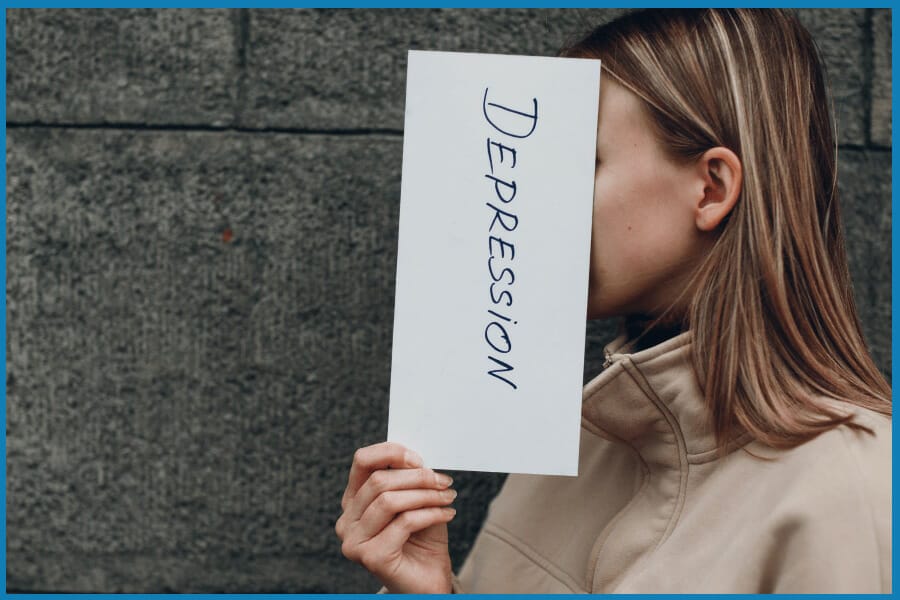Depression often feels like a heavy cloak of isolation wrapped around you, creating a barrier between you and the rest of the world. As a result, it can be a struggle to get through each day, let alone communicate your feelings to others. But breaking that silence can be the first step towards healing.
Remember, it’s okay to seek help, and it’s okay to let others in. In this blog post, we will guide you through understanding your feelings, preparing for the conversation, articulating your depression, dealing with different reactions, seeking professional help, and maintaining communication about your mental health.
We hope that these tips will provide you with a helpful roadmap on this challenging journey.
Understanding Your Feelings: The First Step Before You Tell Someone You’re Depressed

Depression is more than just feeling sad or having a bad day. It’s a serious mental illness that can affect every aspect of your life. Recognizing and understanding your feelings is the first step to letting others in.
Recognizing the Signs of Depression
Depression can manifest in many different ways, and it’s important to recognize the signs. They can be both emotional and physical, significantly affecting your daily life.
Everyone’s experience with depression is unique, and you might not have every symptom on the list. However, if you’ve been experiencing several of these symptoms for more than two weeks, it might be depression:
- Persistent feelings of sadness or emptiness
- A sense of hopelessness or pessimism
- Irritability or frustration
- Loss of interest or pleasure in activities you once enjoyed
- Difficulty sleeping, early-morning wakefulness, or sleeping too much
- Changes in appetite or weight (significant weight loss or gain)
- Feelings of worthlessness or guilt, fixating on past failures
- Difficulty thinking, concentrating, or making decisions
- Fatigue or lack of energy
- Restlessness or decreased activity noticed by others
- Unexplained physical problems, such as back pain or headaches
- Frequent or recurrent thoughts of death, suicidal thoughts, suicide attempts, or suicide
Depression can sometimes be associated with Post-Traumatic Stress Disorder (PTSD), especially if it results from a traumatic event. Learn more about PTSD and its treatment options here.
Accepting Your Condition: It’s Okay to Be Not Okay
Once you recognize the signs of depression, it’s time for acceptance. This can be one of the hardest steps. Society often promotes a “happiness at all costs” mentality, which can make it difficult to admit that you’re not okay. But remember, it’s okay not to be okay.
Accepting your condition doesn’t mean resigning yourself; it means acknowledging that you’re dealing with something real and significant.
This acceptance is the first step towards seeking help and opening up to others about your struggle.
The Importance of Self-Awareness in Depression
Being self-aware means recognizing your triggers, knowing your limits, understanding your coping mechanisms, and realizing when your symptoms might worsen. It also involves acknowledging your feelings without judgment. This self-awareness can guide you when deciding how to tell someone you’re depressed, helping you communicate your feelings accurately and honestly.
Preparing for the Conversation: How to Plan Ahead Before You Tell Someone You’re Depressed

Once you’ve recognized and accepted your feelings, the next step is preparing to share your experience with someone else. This process involves careful thought and consideration.
Choosing the Right Person to Tell
Deciding who to talk to about your depression is a critical first step. The person you choose should be someone you trust and feel comfortable with. Here are a few things to consider when choosing the right person:
- Relationship: Close friends, family members, partner, or mentor –– you want someone who knows you well and believes will respond with empathy and understanding.
- Trustworthiness: You want to confide in someone who will respect your privacy and confidentiality.
- Supportiveness: The person should be someone who can provide emotional support, listen without judgment, and potentially help you explore the next steps, such as seeking professional help.
Deciding on the Right Time and Place
The setting in which you choose to have this conversation can significantly impact how it unfolds. Aim for a quiet, private place where you won’t be disturbed or rushed. As for timing, choose a moment when the person you’re speaking to isn’t stressed or distracted. Here’s what to consider:
- Privacy: Choose a setting where you feel comfortable expressing your feelings without fear of being overheard or interrupted.
- Time: Ensure you and the other person have enough time for a thorough discussion. You don’t want to feel rushed through such an important conversation.
- Distraction-free: Choose a time when you both can focus on the conversation, not when the other person feels obligated, busy, stressed, or distracted.
Practicing What You Want to Say
It’s okay to feel nervous about opening up regarding your depression. To ease this anxiety, consider practicing what you want to say beforehand. This doesn’t mean scripting every word, but having a general idea can help guide the conversation.
- Clarify your feelings: Before the conversation, writing notes can help you articulate your emotions during the discussion.
- Plan your main points: Think about the talking points you want to get across. For example, how depression affects your life and what kind of support you might need.
- Be patient with yourself: It’s okay if you struggle to find the right words. Talking about major depression is challenging, and taking your time is okay.
Communicating Your Depression: Tips on How to Tell Someone You’re Depressed

After preparing for the conversation, it’s time to actually communicate your feelings. This is the most challenging part for many people, but there are strategies to make it easier and more effective.
Using “I” Statements to Express Your Feelings
One effective strategy is to use “I” statements. These allow you to express your feelings without blaming or criticizing others. It’s a way to take ownership of your emotions and experiences.
Here are a few examples:
- Instead of saying, “You don’t understand me,” you might say, “I feel like I’m not being understood.”
- Rather than, “You’re not helping me,” you could say, “I need more support and understanding.”
Being Honest and Clear About Your Condition
When telling someone you’re depressed, it’s essential to be honest and clear. This can be challenging, especially if you’re worried about how they’ll react, but it’s crucial for effective communication.
- Be open about your symptoms: Explain how depression affects your daily life. This could include changes in your sleep or appetite, lack of motivation, or difficulty enjoying things you used to love.
- Clarify that it’s a serious condition: Ensure they understand that depression or substance abuse is a serious mental health condition, not just feeling sad or blue.
- Express your needs: If you know what kind of support you need, whether it’s simply a good listener, supportive people, or help seeking professional assistance, let them know.
Sharing Your Experiences, Not Just Your Diagnosis
While it’s crucial to explain that you’re dealing with depression, it’s equally important to share your personal experiences. This helps put a human face on a clinical diagnosis and allows the person you’re talking to better understand your struggle.
- Discuss your feelings: Instead of just stating that you’re depressed, explain how it feels. This might be feeling empty, extremely tired, or like you’re carrying a heavy burden.
- Talk about your daily struggles: Share how depression affects your day-to-day life. This could include struggles with tasks that seem easy to others or how it’s affecting your work, school, or relationships.
- Share your journey: Let them know how long you’ve felt this way and what steps you’ve taken to address it. This can include any self-care practices you’ve tried, therapists you’ve seen, or medication you’ve taken.
Dealing with Different Reactions: What to Expect When You Tell Someone You’re Depressed

When you decide to break the silence and share your struggle with depression, you’ll likely encounter a range of reactions. Understanding and preparing for these responses can help you navigate these conversations more effectively.
Understanding and Handling Supportive Reactions
Supportive reactions can vary. Some individuals express empathy and concern, while others offer help or suggest solutions. Here’s how to handle such responses:
- Accept their support: If someone offers their assistance, whether it’s just being there to listen or helping you find professional help, accept their support graciously.
- Express gratitude: Thank them for their understanding and willingness to support you. This helps reinforce the positive behavior and makes them more likely to continue being supportive.
- Be open to their suggestions: While you don’t have to agree with or follow every piece of advice, be open to their suggestions and consider their perspective.
Coping with Dismissive or Negative Reactions
Unfortunately, not everyone will respond to your disclosure with understanding or empathy. Some might dismiss your feelings, offer unhelpful advice, or react negatively. Here’s how to cope:
- Stay calm: If someone reacts negatively, try to stay calm. Remember, their response reflects their understanding (or lack thereof) of depression, not your worth or the validity of your feelings.
- Stand your ground: Politely but firmly reiterate that depression is a serious mental health condition, not just feeling down.
- Seek other support: If someone isn’t supportive, seeking support elsewhere is okay. You deserve understanding and empathy.
Responding to Questions and Misconceptions About Depression
When you tell someone you’re depressed, they might have questions or misconceptions about depression. This is your chance to educate them:
- Be prepared to explain: Have a basic explanation ready about what depression is and how it affects you. You could mention that a common and serious medical illness negatively affects how you feel, think, and act.
- Address misconceptions: If they hold misconceptions, like depression is a sign of weakness, or it’s something you can just “snap out of,” gently correct them.
- Guide them to resources: If they’re willing to learn more, guide them to reputable mental health resources where they can learn more about depression.
Seeking Professional Help: The Next Step After You Tell Someone You’re Depressed

Telling someone about your depression is a significant step. However, it’s equally important to seek professional help to manage your symptoms and navigate your journey toward mental wellness. With the right support, you can learn effective strategies to cope with depression.
Finding the Right Therapist or Psychiatrist
Finding a mental health professional who you feel comfortable with is crucial. They can provide you with a proper diagnosis, treatment options, and a safe space to discuss your feelings. Here’s what to consider:
- Specialization: Look for professionals who specialize in major depressive disorder or mood disorders.
- Comfort: Finding someone you feel comfortable talking to about your personal experiences and feelings is important.
- Availability: Consider their availability, location, and whether they accept your insurance.
In Florida, numerous treatment centers are offering specialized care for depression. For instance, Kinder in the Keys, a depression treatment center for women provides customized, safe, and holistic care, can be a great place to start.
Discussing Medication and Therapy Options
Once you’ve found a inpatient depression treatment center, ask about their different treatment options for depression. This often includes medication, therapy, or a combination of both.
- Medication: There are several types of antidepressants available. Finding the medication that works best for you may take some time and patience.
- Therapy: Cognitive-behavioral therapy (CBT) and interpersonal therapy (IPT) are among the most effective treatments for depression. Your therapist can help you navigate your feelings, develop coping strategies, and work towards recovery.
- Combination: For many, a variety of medication and therapy proves most effective. Your healthcare provider can help determine the best approach for you.
Utilizing Support Groups and Online Resources
In addition to professional help, support groups, and online resources can also be invaluable. They can provide a sense of community and allow you to learn from others’ experiences.
- Support groups: These groups offer a safe space to share experiences, learn coping strategies, and feel less isolated. Your mental health professional can often recommend local groups.
- Online resources: Websites, online forums, and mental health apps can provide additional support and resources. Just ensure the resources are from reputable sources.
If you’re in Florida and seeking professional help for depression, consider checking out our guide on the Best Depression Treatment Centers in Florida. It can help you navigate the selection process and find the right center for your needs.
Moving Forward: How to Maintain Communication After You Tell Someone You’re Depressed

Telling someone you’re depressed is just the beginning of your communication journey. Maintaining an ongoing conversation about your mental health is crucial as you navigate through depression.
Continuing the Conversation About Your Mental Health
Keeping the lines of communication open about your feelings and experiences is important. It helps the person you confide in stay updated on your progress and understand how they can continue to support you.
- Regular updates: Share how you’re feeling and what’s happening. This could be during regular catch-ups or when you’re going through a particularly rough patch.
- Share your victories: Don’t forget to share your victories, no matter how small. This could be a good day, a successful coping strategy, or improving your symptoms.
- Be honest: If things aren’t going well, be honest about it. It’s okay not to be okay; sharing these moments can be just as important as sharing your victories.
Encouraging Loved Ones to Educate Themselves About Depression
Education is a powerful tool for understanding and coping with depression. Encourage those you’ve confided in to educate themselves about the condition.
- Share resources: Provide them with reputable resources about depression. This could be books, websites, or online courses.
- Invite them to appointments: If you’re comfortable, you might invite them to a therapy session or doctor’s appointment. This can provide them with firsthand knowledge and advice.
- Address misconceptions: If they have misconceptions or misunderstandings about depression, take the time to clarify and provide accurate information.
Setting Boundaries and Asking for What You Need
It’s important to set boundaries and ask for what you need from the people you’ve shared your depression with. This can help maintain your mental health and ensure your relationships remain supportive.
- Express your needs: Be clear about what kind of support you need. This could be someone to listen, help with daily tasks, or accompany you to appointments.
- Set boundaries: Let them know if there are topics you’re not ready to discuss or if there are things that you find unhelpful or triggering.
- Encourage self-care: Remind them that taking care of their mental health is also important. Supporting someone with depression can be challenging, and they must also look after themselves.
Takeaway: Embracing the Journey After You Tell Someone You’re Depressed
As you move forward, embrace the journey. Of course, there will be ups and downs, victories and setbacks. But with each step, you’re getting closer to understanding and managing your depression.
Remember, it’s okay to reach out, it’s okay to seek help, and it’s okay to prioritize your mental health.
So, take the next step. Reach out to Kinder in the Keys and explore how they can support you on your journey to better mental health. Embrace your journey—you’re worth it.
